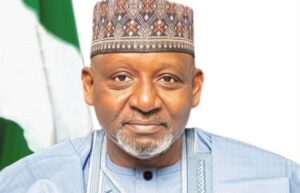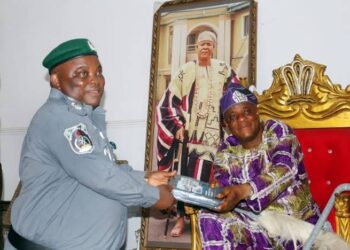By the time he is done on May 29, 2023, Mr Mu’azu Sambo will likely be holding the tittle of the Minister of Transportation who has the shortest tenure. He will serve for just about nine months.

He also acknowledged this, when he resumed at his office and addressed staffers of the Ministry penultimate week in Abuja. I am here for a very short time, he said. It will end on May 29, 2023
The new Minister has pledged to give his best towards achieving President Muhammadu Buhari’s Infrastructure Development Agenda in the transport sector.
No doubt, the Ministry of Transportation is big. Agencies under the Ministry include: Nigerian Institute of Transport Technology, Nigerian Railway Corporation, National Inland Waterways Authority, Maritime Academy of Nigeria, NIMASA, NPA, Council for Regulation of Freight Forwarding in Nigeria.
As a maritime media outfit, we are worried about the mirage of problems that this new Minister and his Minister of state have inherited; especially in the maritime sector.
There are challenges at each of the agencies; there is hardly any segment of the nation’s maritime sector that does not have of one issue or another.
But, at the risk of being accused of patronizing him, we think that, in actual fact the immediate past Minister; Mr Rotimi Amaechi did enough to make things easy for Mu’azu Sambo. Amaechi remains one minister who engaged with maritime industry stakeholders a lot. It is however debatable if those engagements achieved the desired results. But, the new minister only needs to open the files and concentrate on a few items.
Without dwelling so much on sectoral challenges, the new Minister already has his cup full. He will be confronted with a lot of issues, such as the ports’ access roads, implementation of the Cabotage Act, and the CVFF. Indigenous ship owners will appeal for his intervention. He will be told about how the challenges of the National Seafarers Development Programme (NSDP). The new Minister will be confronted with the need to review the concession agreement with the port terminal operators and the pending renewal of the contracts. He will also have to attend to the challenges of making the Inland Dry Ports work as envisioned by the government. The challenges are indeed many.
The fact is that; he does not need to reinvent any wheel. There is a road map at the Ministry, there have been several engagements with stakeholders in the industry. So, there exists a road map to work with.
However, there are a few things that the minister can get done within a few months of this administration. That is, if he has the political weight to push his ways around the corridors of power.
We will like to inform the Minister that the National Transport Commission (NTC) Bill is one of the low-hanging fruits that he can easily pluck. The Bill has once been rejected by the Presidency for some infarctions, it has since been re-worked by the National Assembly, and reportedly ready for President Muhammadu Buhari’s assent.
Perhaps, the NTC is what the Nigerian transportation sector needs to revolutionise it, as the National Communication Commission has done to the telecoms industry.
Another low-hanging fruit that the Minister can feast on in such a short time is the controversial Cabotage Vessel Finance Fund (CVFF).
Read Also: What are your expectations from the new Minister of Transportation?
The minister should know that, the CVFF is directly at the heart of indigenous shipping in Nigeria. Being a maritime nation, there is need for Nigerian ship owners to be involved a lot more coastal shipping. The disbursement of CVFF will positively affect the Nigerian maritime industry.
Maybe, the new minster can also within the short time that is available, attend to the yawning gap between rail transportation and cargo evacuation from the ports to the hinterland.
For us as a maritime media organisation, we know that an efficient port system requires an equally efficient rail system and an efficient road network.
Granted that the former minister did so much in the rail sector, but the Nigerian Railway Corporation has not been as complimentary as it should be in the delivery of cargoes from the ports to the hinterland, where there exists some Inland Dry Ports. This has led to over reliance on the road as a means of conveying goods out of the ports.
We are aware that the Kaduna Inland Dry Port is currently lacking direct rail connectivity from Lagos port. The Dala Inland Dry Port in Kano, is going to face the same challenge when it is commissioned.
If the new minister devotes more of his attention to the few issues identified above, he may have spent the most meaningful short time in the Transportation ministry as the minster.
With a background in the maritime sector, beginning with the NPA, and ending it at the NIWA from where he retired, it should not be difficult to make the few months to be impactful.
At the end of his tenure, we will be back to hold him to his words when he resumed at the Transportation Ministry recently. Speaking on the next level of work and action, he had told staff of the ministry that, “we will look for the low hanging fruits and make sure that we put them on the table as quickly as possible.”
Kindly like us on Facebook/twitter















